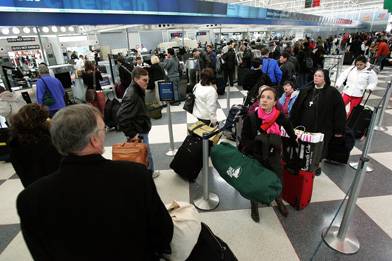
Traveling While Trans: When the Security Line Is Anything But Secure
Blog Search
This blog post was co-authored by Crispin Torres, Lambda Legal Community Educator, and Aisha Davis, Tyron Garner Memorial Fellow for African-American LGBT Civil Rights.
On September 21, Shadi Petosky attempted to board a flight at the Orlando International Airport, when she was stopped by Transportation Security Administration (TSA) agents who flagged her crotch as an “anomaly.”
Shadi informed the agents that she is transgender. Shadi was then told that she was male and had to be scanned as such, with an agent telling her that he “knew what he was doing.”
At this point, a supervisor from TSA told Shadi and the agents that she could not go through the body scanner again and swabbed Shadi for explosives, with the machine indicating a positive. The results of the explosives swab led the TSA agents to move Shadi to a private room for further screening, including a full-body pat down by a female TSA agent.
TSA agents then told Shadi that she would have to face even more screening. After she refused, the police were called. The police demanded to know Shadi’s sex and told her that she must comply with their instructions. At this point, numerous police officers had arrived, including one who began taunting her. A bomb expert went through every piece of her luggage and found no evidence of explosives.
Throughout this experience, Shadi felt denigrated by TSA’s discriminatory behavior. Shadi faced public outing and undue scrutiny simply because she is a trans person navigating a world where her very existence is challenged. Shadi is not alone. The #TravelingWhileTrans tag on Twitter is an anthology of the harmful treatment trans travelers experience – often at the hands of the TSA.
In the aftermath of this incident, a TSA spokesperson defended the actions of the agents who interacted with Shadi in September, saying that the officers followed “TSA’s strict guidelines” throughout the screening. However, trans advocates and activists have long spoken out against the TSA subjectively gendering passengers based on appearance and presentation – which is listed as the first step of the screening process – as a means of security screening. In fact, Shadi followed the guidelines listed on the TSA’s website for transgender passengers and she still faced horrific treatment.
Notably, the National Center for Transgender Equality (NCTE) filed a lawsuit against the Department of Homeland Security for failing to create regulations for the TSA’s use of full body scanners. This lawsuit comes four years after the U.S. Court of Appeals for the D.C. Circuit found that the TSA violated federal law through the use of body scanners without devising a formal policy or taking public comment.
Additionally, on October 8, 32 Congressional Democrats released a letter calling the TSA’s guidance on screening procedures “insufficient” and stating that the existing protocol may be “well-suited to screen some cisgender passengers, but they do so at the expense of singling out transgender or gender nonconforming individuals.” In this letter, the lawmakers “urge the TSA to implement a screening protocol that does not rely on [TSA agents] making often-subjective decisions about an individual’s gender identity” ; “request that the TSA publishes detailed guidelines on its website to address…commonly asked questions…and to include clear explanation of the civil rights protections to which all transgender passengers are entitled to during the screening process” ; “request that all TSA personnel are adequately trained to serve the transgender community” ; and “request the TSA’s full cooperation in [the] investigation” of Shadi’s case.
Shadi is also calling for an end to the discrimination trans travelers face at the hands of the TSA: “The mistreatment of transgender passengers by the TSA is a solvable problem. Including trans and gender nonconforming people into screening protocols can be done with existing equipment and no disturbance to other passengers. I hope that the TSA can commit to educating their staff at all locations with LGBTI cultural awareness and reexamining their security protocol as it impacts not just trans folks but many people affected by gender policing. Right now officers look at a person, make a guess based on whatever worldview they came in with, press a pink or blue button, then hold the passenger responsible if they don't fit that guess.”
We at Lambda Legal appreciate Shadi’s willingness to share her story, bringing greater attention to the harassment trans passengers face when traveling. We also recognize that Shadi’s story is just one of many and are calling on TSA to take immediate and comprehensive steps to reform its current screening policy. Any new policies should not only eliminate discriminatory practices, but create an accountability process that will adequately address situations like Shadi’s.
Read our advocacy letter.




